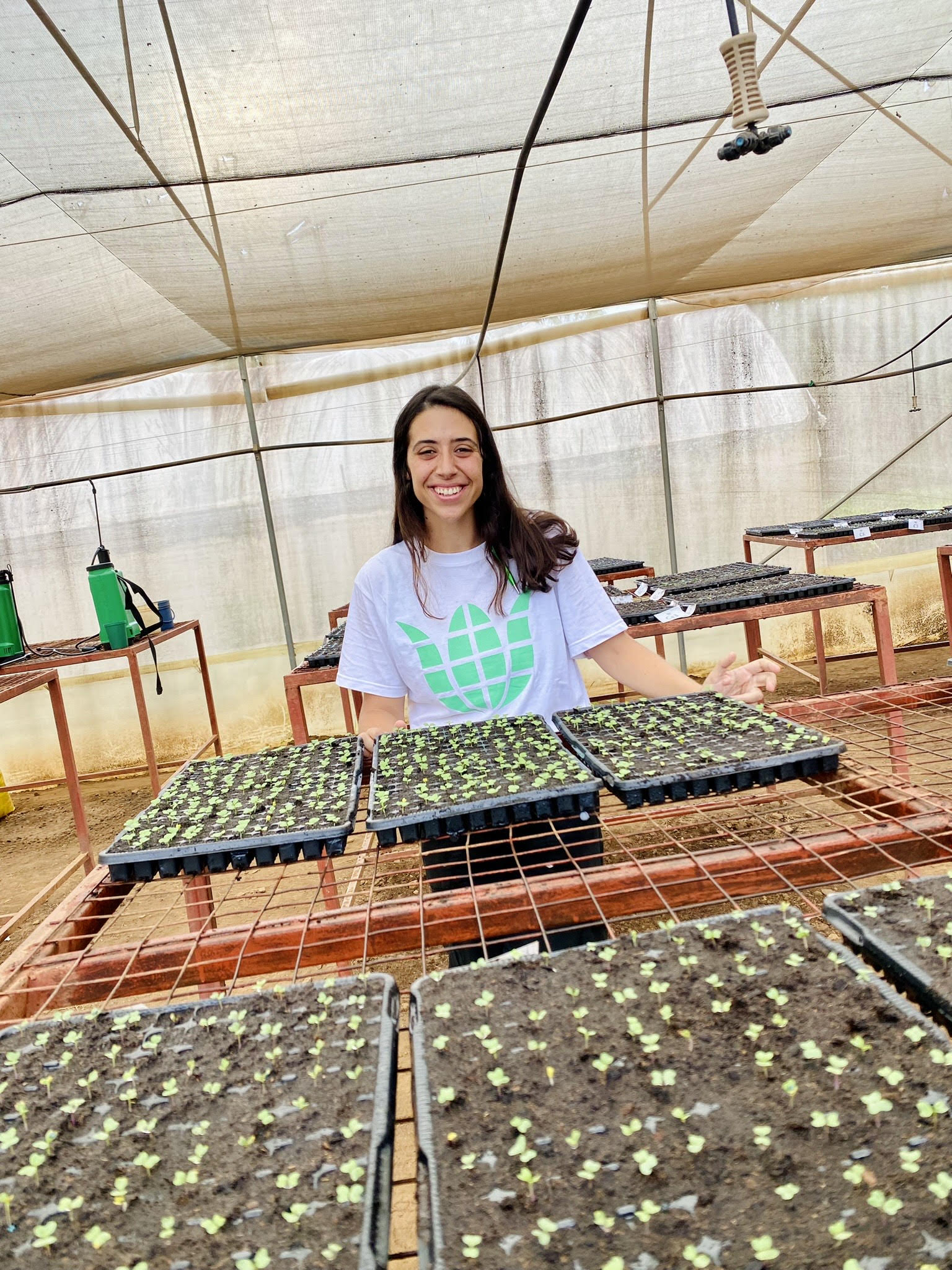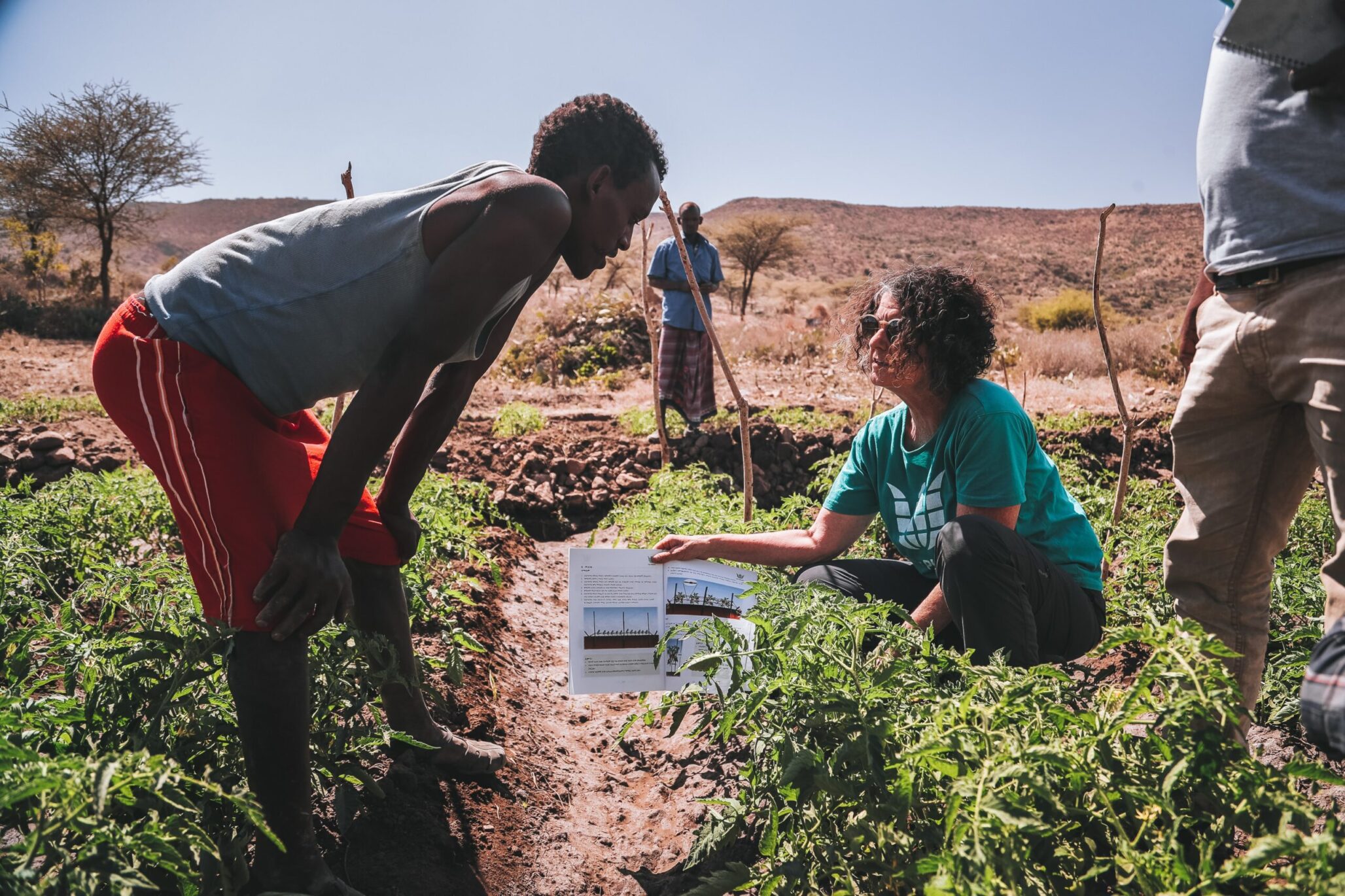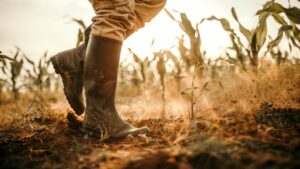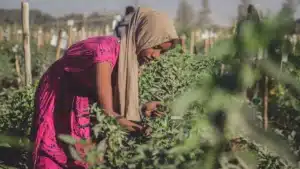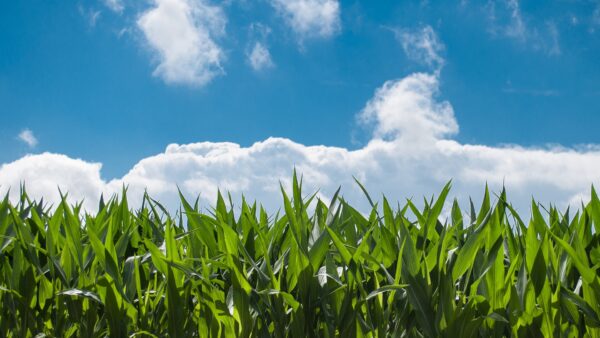Why it Matters
People in Africa are trapped in a vicious cycle of poverty and hunger. And it is difficult to provide them with food security and economic opportunities. One way of helping is by making high-quality vegetable seeds, suitable to local conditions, accessible and affordable to local farmers.
NGO Fair Planet is bridging the current gap between existing high quality seed varieties developed by leading seed companies and transfer technologies and know how to smallholder farmers in Africa. European Seed sat down with Shoshan Haran, founder and president of Fair Planet to find out how they do it.
Read part one.
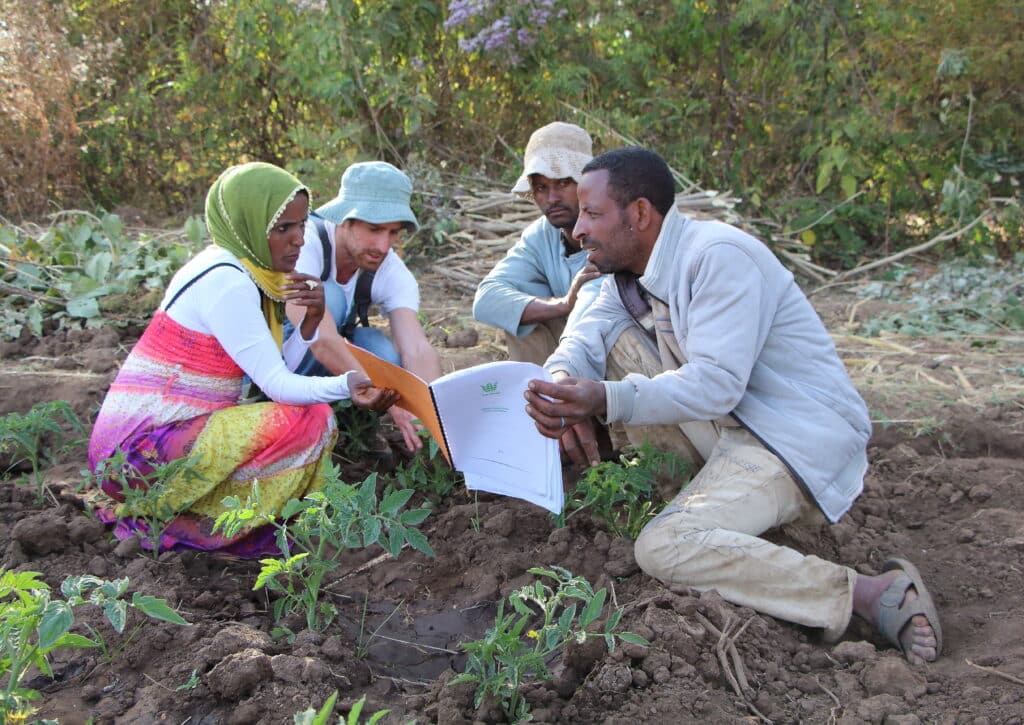
From left to right: Achamylash Adebebe (extension agent from the local bureau of agriculture), Amir Ben Cohen (Fair Planet volunteer), Endale Tilahun (neighbour farmer) and Negash Temsgen (lead farmer). Photo taken by Aviv Havron
European Seed (ES): Can you share some achievements?
Shoshan Haran (SH): The results of Fair Planet’s unique methodology are outstanding: in Ethiopia, thanks in part by support of a 5-year subsidy from the Dutch government, Fair Planet, together with Haramaya University and the local bureaus of agriculture, trained 150 local trainers and mentored more than 2,300 lead farmers in 65 villages. Due to fast adoption of better seeds and improved farming practices, more than 75,000 smallholder farmers in the project’s regions have tripled their food production. They generated an average net-income of $470 USD from vegetable farming, in only one production season, which increased their households’ annual income by 26 per cent. In parallel, the intervention contributed to a significant growth of the private sector: sales of vegetable seedlings by local plant raisers in Ethiopia increased from 12 million in 2015 to more than 200 million in 2020, and according to a 2021 market study commissioned by the Dutch embassy in Addis, within five years, the annual value of imported vegetable seeds into Ethiopia increased by $7.9 million USD.
An external impact evaluation of the program, done by the Hebrew University, found that 96 per cent of the farmers’ household members, more than 485,000 people, benefitted from improved nutrition and 45 per cent of them used their increased income to send their children to school. This percentage is very significant since the median age of the farmers is 32 years old and only about half of them had school-aged kids, which means that almost all the farmers who had school-aged kids used their additional income to support their education. Furthermore, the study found that 96 per cent of the farmers saved money for future needs and can re-invest in generating income from farming in a sustainable manner.
To measure the success of the aforementioned exit strategy we use the following indicator: (a) suitable crop varieties are available and (b) affordable for local farmers; (c) a critical mass of trained local professionals is reached and takes full ownership of continuing the training; and (d) a substantial percentage of the target population are successfully using high quality seeds, with farming as a sustainable and reliable income source. This exit strategy has proven to be successful in the Meskan region in Ethiopia, where the project met all four criteria within six years.
ES: You are now active in two countries, Ethiopia and Tanzania. Which countries are in the pipeline for future rollout?
SH: In Ethiopia, we started by introducing high quality seeds for the main vegetable crops: tomato, hot-pepper, onion, and cabbage. Nowadays, we are focusing on introducing more vegetable crops (watermelon, beetroot, broccoli, carrots and more), to diversify our offer to farmers, so they can maintain proper crop rotation and respond to market demands. We also started testing potato varieties, the world’s 4th most important food crop. Current potato yields in Ethiopia are very low, mainly due to lack of high-quality potato germplasm and starting material. True Potato Seed (TPS), a technology developed in recent years, was suggested as a promising alternative seed source for potato production in developing countries since they are disease-free, easy to transport and store and available for year-round planting. Growing potatoes from certified seed potatoes of high-quality varieties, from hybrid TPS, or from apical root cuttings, rather than from vegetative propagated local tubers, can provide numerous advantages for the local farmers.
Our intervention in Tanzania started in 2019, in collaboration with Sokoine University in Morogoro. We perform variety trials in 2 locations, mid-land and highland, and are starting the training program together with the local extension system and in collaboration with SUGECO, a local cooperative that supports local agribusiness entrepreneurial activities.

From left to right: Reut Lazar (Fair Planet site coordinator) with Tajie Tesfaye (a lead farmer). Photo taken by Lior Sperandeo
Recently, the International Seed Federation (ISF) announced its commitment to contribute to the transformation of food systems by assisting farmers to produce more in a sustainable and resilient manner on less land and with less inputs (See Statement of initiatives). One of the four initiatives that ISF committed to undertake is “Building a Seed Resilience project” with partners for a sustainable seed system based on inclusiveness in a country. Moreover, ISF would like to showcase concretely the daily work of seed companies with smallholder farmers, to help undermine the alleged opposition between Farmers’ Rights and Breeders’ Rights.
The ISF Board of Directors chose Fair Planet to implement the ISF Seed Resilience project in Rwanda, based on its 10 years of experience in Africa. The project will undertake a more holistic approach and will address the main food and nutrition pillars of Rwanda’s population: fresh vegetables for vitamins and fibres, pulses for proteins and potatoes and cereals for carbohydrates. It can serve as a model for future projects aiming to increase food and nutrition security in additional African countries and will show that the seed industry, as an important sector that develops seeds for food production and helps farmers to increase their income, can significantly contribute to the establishment of local and more resilient food systems and can contribute to achieving the UN SDG goals.
ES: What challenges do remain?
SH: The main challenge is getting access to sufficient funding to up-scale the outreach to more countries and reach the millions of farmers who need our help. It is important to note that only about 20 per cent of Fair Planet’s resources, in terms of budget and manpower, are invested in the technical phase of variety trials, while the remaining resources are invested in building the capacity of local trainers and lead farmers. We were surprised to find that raising funds for such an effective intervention is not an easy task. We look for additional companies, organizations and donors who will be interested in joining our efforts to increase food and nutrition security and improve the economic situation of the poorest farmers.
ES: How can the EU seed sector help Fair Planet?
SH: First and foremost, we would like more seed and seed technology companies to join the Fair Planet platform. We are expanding the platform to include vegetables, cereals, potatoes and pulses. We are looking for companies with high quality germplasm and seed technologies for these food segments that are interested in growing their markets in Africa. Even in the vegetables segment, there are many more companies who can join us yet.
And of course, the readers of the European Seed magazine can spread the word and create awareness that will attract private donors and aid organizations who are interested in tackling the root causes of the growing food and poverty crises.
Where on the web: Developments on the ISF initiative will be published both on Fair Planet and ISF websites.

Gal is a talented and young woman from the kibbutz Kiryat-Anavim in Israel where she was educated in an agricultural environment and gained a lot of experience in training. She volunteered in the harsh conditions of East Ethiopia with Fair Planet, a non-profit organization that works with multiple European seed partners in Africa for the benefit of smallholder farmers, conducts vegetable variety trials to identify the best locally adapted ones and trains farmers on good agricultural practices.
Through her volunteering work, Gal witnessed the dramatic increase in yield and income that high-quality seeds bring to farmers and the positive impact on their families’ livelihood. She decided to join Fair Planet as a full-time employee and leads its operations in Tanzania. Gal manages multiple variety trials and is launching a training program that will make high-quality seeds accessible to Tanzanian farmers. Gal inspires all the people around her: volunteers, farmers, local staff and the European seed partners as well as her family and friends, who are proud of her work.


